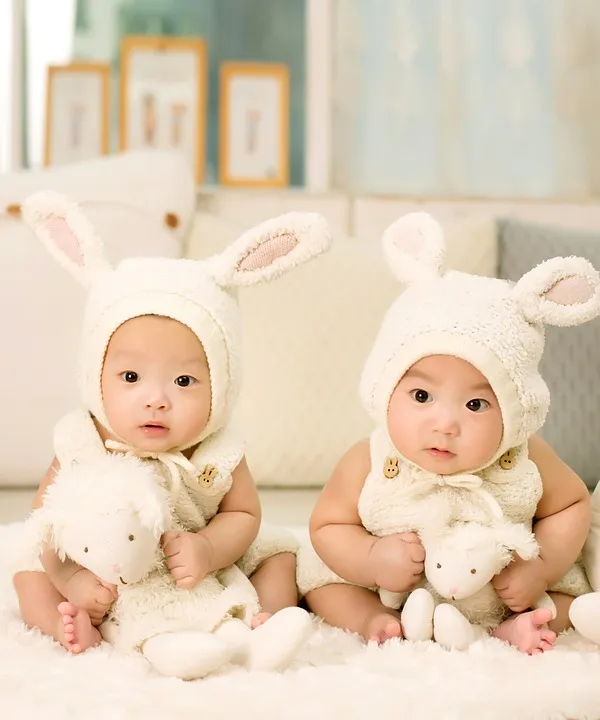Not that it's that important, really. But I've often been curious about when twin children are old enough to understand the fact that they're twins, and what that means (in broad strokes, anyway). Just as Alastair and I don't know any other way of parenting except the two-at-a-time sort, our girls don't know any kind of existence but the there-is-another-person-who's-always-around sort. They are peretually aware of each other, looking out for each other, competing with each other.
Meanwhile, most of their "friends" (i.e. the children of our friends) are singletons. But if they find this state of being strange (Where's the person you fight over stuff with all the time? Who's the other person in your room? You mean you get your parents all to yourself?) then they certainly don't give any indication. Now that the girls are more verbal, we've started talking about the fact that they're twins sometimes, usually in reference to other twins they sometimes play with: Ethan and Emmett are twins just like you! Milo and Amelia are twins, just like you! Etc. I wonder if, when they hang out with their singleton pals, they wonder where the "other one" is?
We recently got a book from the library called Hello, Twins, about a brother-sister pair of twins, Charlotte and Simon. It's not that great a book, really. I mean, it's fine -- just not terribly original or interesting. (Then again, Clio and Elsa love it, and they're the target audience, so who am I to judge?) Anyway, it's about how these two kids are very different, but they like each other just the way they are. And, oh yeah, they're twins.
What is interesting, is that since we've several times introduced the book by explaining that "Elsa and Clio are twins, just like Simon and Charlotte," they've started calling it the "Elsa and Clio book" and have identified with each of the characters: Elsa is Charlotte and Simon is Clio. I find it fascinating that they arrived at this on their own, since many of the characters' traits actually synch up fairly well with that comparison. Elsa is in some ways the "girlier" kid, and Clio the more tomboyish. (Except when they're not, of course.) Elsa likes to eat everything on her plate and Clio doesn't, just like Charlotte and Simon, respectively. Like Charlotte and Simon, Elsa likes to build things and Clio likes to knock them down. (Well, actually, they pretty much switch-hit on that one.)
Anyway. Once they understand that they're twins and what it means -- maybe when they're three or four? -- surely slightly dicier questions will follow: Does that mean we're exactly the same? Who's older? Do you like one of us better? And -- the trickiest one of all -- why are we twins? Not that this would be an issue for quite some time, but do parents eventually -- or ever -- tell their kids that they are the result of fertility treatments? It's obviously not on par with telling kids that they're adopted, but I do wonder if it's a difficult subject to broach, and one fraught with all kinds of existential questions for the child/children: was I "unnatural"? Do you wish you hadn't had both of us? Was one of us a mistake? Worst of all, when they're teenagers, they can actually throw a little weight behind that classic counter-argument: Hey, I didn't ask to be born!
I don't know how or if you're supposed to talk to your kids about the fact that they're twins, and what kind of effect this knowledge has on them. Our philosophy has always been to celebrate their individuality -- we don't dress them alike, we try very hard not to compare them, we rarely call them "the twins" -- and not make a big deal of the fact that they're twins. Hell, we live in the state with the highest twin birth rate in the country, so it's not like they're going to grow up feeling like either freaks of nature or wonders thereof. Maybe it will mean no more to their senses of self than being the oldest, youngest or middle child does.
But somehow, I suspect that the knowledge that you're a twin is a little more complicated than that; a little more puzzling, a little more influential. (This is probably even moreso for identical twins.) I just hope that, on the balance, it's a good thing.
